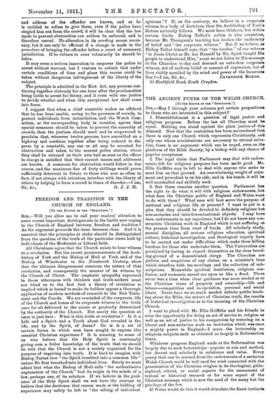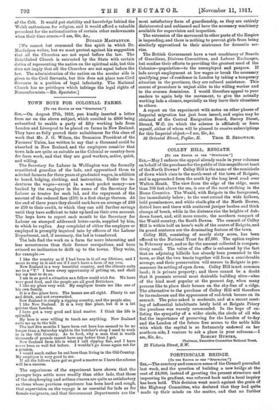THE ANCIENT FUNDS OF THE WELSH CHURCH.
[To THE EDITOR OF THE "SPECTATOR1
SIE,—May I through your columns put certain propositions to those who are interested in this subject P
1. Disestablishment is a question of legal justice and religious progress. Before the law all Churches must be equal. Nothing can stand against the plain justice of this demand. Now that the contention has been surrendered that there is only one Church which represents Christianity, and only one whose ministrations are necessary to eternal salva- tion, there is no argument which can be urged, even on the platform of the Bible Society, by a bishop with any chance of popular acceptance.
2. The legal claim that Parliament may deal with endow.
manta left for religious purposes has been ?made good. Mr. Ellis Griffiths may be left to deal with anyone who seeks to meet him on that ground. An overwhelming weight of argu- ment and precedent is on his side, and in his hands it will be well marshalled and skilfully used.
3. But there remains another question. Parliament has
the right to do what it will with religious endowments, but what does the Christian public of England and Wales want to do with them? What uses will best serve the purpose of national and religious life at present P I want to put in a plea that they should be devoted to definitely religious but non-sectarian and interdenominational objects. I may have been unfortunate in my experience, but I do not know any con- structive Christian work in England which is not suffering at the present time from want of funds. All scholarly study, mental discipline, all serious religious education, spiritual culture, historical investigation, and theological inquiry have to be carried out under difficulties which make them killing burdens for those who undertake them. The Universities are paralysed by having to regard themselves as the close breed- ing-ground of a domesticated clergy. The Churches are jealous and suspicious of any claims on a minister's time which interfere with tea-meetings and the collection of sub- scriptions. Meanwhile spiritual destitution, religions con- fusion, and economic unrest are upon us like a flood. There never was a time when clear guidance was more needed as to the Christian views of property and ownership—life and labour—competition and co-operation, personal and social ideals. Never have we so much needed definite public teach- ing about the Bible, the nature of Christian truth, the results of historical investigation as to the meaning of the Christian Church.
I want to plead with Mr. Ellis Griffiths and his friends to seize the opportunity for doing an act of service to religion as well as an act of justice to his compatriots by restoring on a liberal and non-sectarian scale an institution which was once a mighty power in England—I mean the lectureship on religious subjects such as obtained so largely in Reformation times.
Whatever progress England made at the Reformation was largely due to such lectureships—popular in aim and method, but devout and scholarly in substance and value. Every penny that can be rescued from the endowments of a sectarian Welsh Church could be well used for work connected with the presentation of the Christian religion in its theological, philo- sophical, ethical, or social aspects for the assessment of textual or historical research or for some aspect of the Christian message which is now the need of the many but the privilege of the few.
If Wales would do this it would stimulate the finest instincts
of the Celt. It would put stability and knowledge behind the Welsh enthusiasm for religion, and it would afford a valuable precedent for the nationalization of certain other endowments when their time comes.—I am, Sir, &c.,
DUGALD MACFADYEN.
[We cannot but commend the fine spirit in which Dr. Macfadyen writes, but we must protest against his suggestion that all the Churches are not equal before the law. The Established Church is entrusted by the State with certain duties of representing the nation on the spiritual side, but this does not imply that all the Churches are not equal before the law. The administration of the nation on the secular side is given to the Civil Servants, but this does not place non-Civil Servants in a position of legal inferiority. The National Church has no privileges which infringe the legal rights of Nonconformists.—ED. Spectator.]



















































 Previous page
Previous page